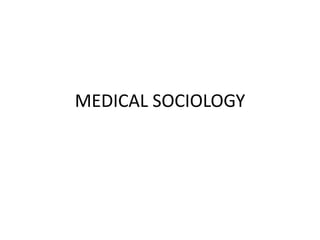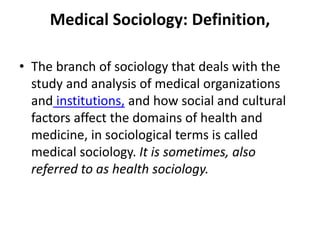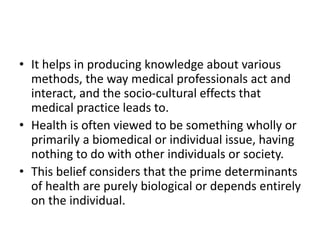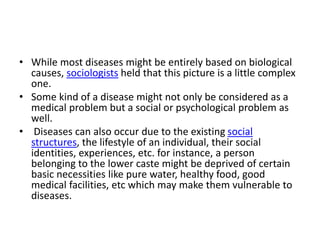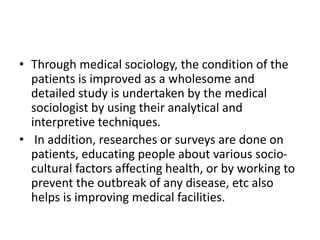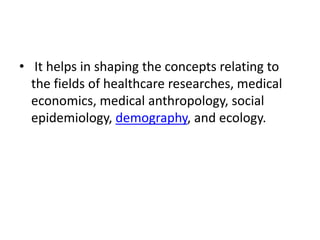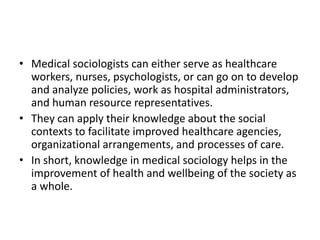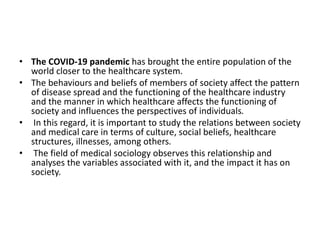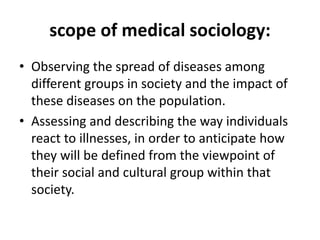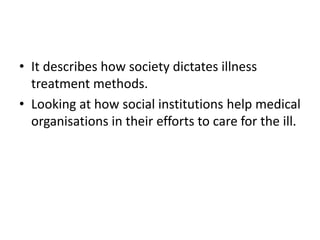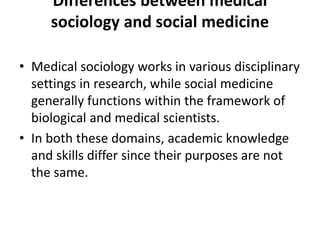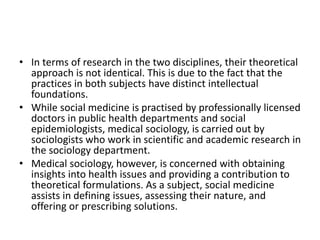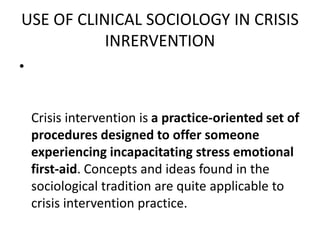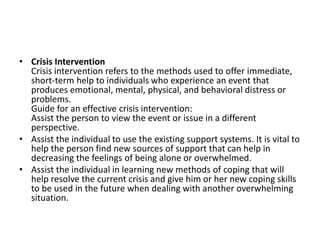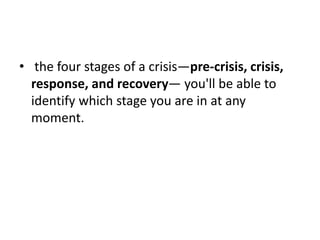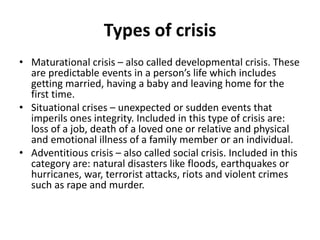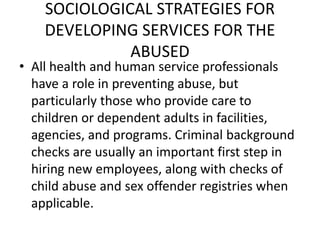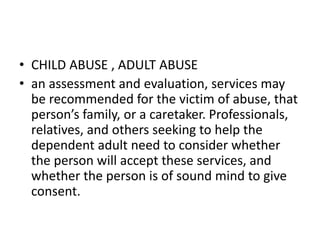MEDICAL SOCIOLOGY.pptx
- 2. Medical Sociology: Definition, • The branch of sociology that deals with the study and analysis of medical organizations and institutions, and how social and cultural factors affect the domains of health and medicine, in sociological terms is called medical sociology. It is sometimes, also referred to as health sociology.
- 3. • It helps in producing knowledge about various methods, the way medical professionals act and interact, and the socio-cultural effects that medical practice leads to. • Health is often viewed to be something wholly or primarily a biomedical or individual issue, having nothing to do with other individuals or society. • This belief considers that the prime determinants of health are purely biological or depends entirely on the individual.
- 4. • While most diseases might be entirely based on biological causes, sociologists held that this picture is a little complex one. • Some kind of a disease might not only be considered as a medical problem but a social or psychological problem as well. • Diseases can also occur due to the existing social structures, the lifestyle of an individual, their social identities, experiences, etc. for instance, a person belonging to the lower caste might be deprived of certain basic necessities like pure water, healthy food, good medical facilities, etc which may make them vulnerable to diseases.
- 5. • Through medical sociology, the condition of the patients is improved as a wholesome and detailed study is undertaken by the medical sociologist by using their analytical and interpretive techniques. • In addition, researches or surveys are done on patients, educating people about various socio- cultural factors affecting health, or by working to prevent the outbreak of any disease, etc also helps is improving medical facilities.
- 6. • It helps in shaping the concepts relating to the fields of healthcare researches, medical economics, medical anthropology, social epidemiology, demography, and ecology.
- 7. • Medical sociologists can either serve as healthcare workers, nurses, psychologists, or can go on to develop and analyze policies, work as hospital administrators, and human resource representatives. • They can apply their knowledge about the social contexts to facilitate improved healthcare agencies, organizational arrangements, and processes of care. • In short, knowledge in medical sociology helps in the improvement of health and wellbeing of the society as a whole.
- 8. • The COVID-19 pandemic has brought the entire population of the world closer to the healthcare system. • The behaviours and beliefs of members of society affect the pattern of disease spread and the functioning of the healthcare industry and the manner in which healthcare affects the functioning of society and influences the perspectives of individuals. • In this regard, it is important to study the relations between society and medical care in terms of culture, social beliefs, healthcare structures, illnesses, among others. • The field of medical sociology observes this relationship and analyses the variables associated with it, and the impact it has on society.
- 9. scope of medical sociology: • Observing the spread of diseases among different groups in society and the impact of these diseases on the population. • Assessing and describing the way individuals react to illnesses, in order to anticipate how they will be defined from the viewpoint of their social and cultural group within that society.
- 10. • It describes how society dictates illness treatment methods. • Looking at how social institutions help medical organisations in their efforts to care for the ill.
- 11. Differences between medical sociology and social medicine • Medical sociology works in various disciplinary settings in research, while social medicine generally functions within the framework of biological and medical scientists. • In both these domains, academic knowledge and skills differ since their purposes are not the same.
- 12. • In terms of research in the two disciplines, their theoretical approach is not identical. This is due to the fact that the practices in both subjects have distinct intellectual foundations. • While social medicine is practised by professionally licensed doctors in public health departments and social epidemiologists, medical sociology, is carried out by sociologists who work in scientific and academic research in the sociology department. • Medical sociology, however, is concerned with obtaining insights into health issues and providing a contribution to theoretical formulations. As a subject, social medicine assists in defining issues, assessing their nature, and offering or prescribing solutions.
- 13. USE OF CLINICAL SOCIOLOGY IN CRISIS INRERVENTION • Crisis intervention is a practice-oriented set of procedures designed to offer someone experiencing incapacitating stress emotional first-aid. Concepts and ideas found in the sociological tradition are quite applicable to crisis intervention practice.
- 14. • Crisis Intervention Crisis intervention refers to the methods used to offer immediate, short-term help to individuals who experience an event that produces emotional, mental, physical, and behavioral distress or problems. Guide for an effective crisis intervention: Assist the person to view the event or issue in a different perspective. • Assist the individual to use the existing support systems. It is vital to help the person find new sources of support that can help in decreasing the feelings of being alone or overwhelmed. • Assist the individual in learning new methods of coping that will help resolve the current crisis and give him or her new coping skills to be used in the future when dealing with another overwhelming situation.
- 15. • the four stages of a crisis—pre-crisis, crisis, response, and recovery— you'll be able to identify which stage you are in at any moment.
- 16. Types of crisis • Maturational crisis – also called developmental crisis. These are predictable events in a person’s life which includes getting married, having a baby and leaving home for the first time. • Situational crises – unexpected or sudden events that imperils ones integrity. Included in this type of crisis are: loss of a job, death of a loved one or relative and physical and emotional illness of a family member or an individual. • Adventitious crisis – also called social crisis. Included in this category are: natural disasters like floods, earthquakes or hurricanes, war, terrorist attacks, riots and violent crimes such as rape and murder.
- 17. SOCIOLOGICAL STRATEGIES FOR DEVELOPING SERVICES FOR THE ABUSED • All health and human service professionals have a role in preventing abuse, but particularly those who provide care to children or dependent adults in facilities, agencies, and programs. Criminal background checks are usually an important first step in hiring new employees, along with checks of child abuse and sex offender registries when applicable.
- 18. • CHILD ABUSE , ADULT ABUSE • an assessment and evaluation, services may be recommended for the victim of abuse, that person’s family, or a caretaker. Professionals, relatives, and others seeking to help the dependent adult need to consider whether the person will accept these services, and whether the person is of sound mind to give consent.
